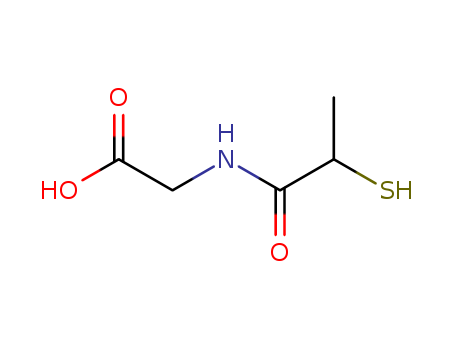- Chemical Name:Tiopronin
- CAS No.:1953-02-2
- Molecular Formula:C5H9NO3S
- Molecular Weight:163.197
- Hs Code.:2942000000
- European Community (EC) Number:217-778-4
- NSC Number:760416
- UNII:C5W04GO61S
- DSSTox Substance ID:DTXSID4023678
- Nikkaji Number:J3.692G
- Wikipedia:Tiopronin
- Wikidata:Q414456
- NCI Thesaurus Code:C47758
- RXCUI:6765
- Metabolomics Workbench ID:67502
- ChEMBL ID:CHEMBL1314
- Mol file:1953-02-2.mol
Synonyms:2 Mercaptopropionylglycine;2 Thiol propionamido acetic Acid;2 Thiolpropionamidoacetic Acid;2-Mercaptopropionylglycine;2-Thiol-propionamido-acetic Acid;2-Thiolpropionamidoacetic Acid;Acadione;Acid, 2-Thiol-propionamido-acetic;Acid, 2-Thiolpropionamidoacetic;alpha Mercaptopropionylglycine;alpha-Mercaptopropionylglycine;Captimer;Meprin;Mercaptopropionylglycine;Thiola;Thiopronine;Tiopronin;Tiopronine



 Xn
Xn


